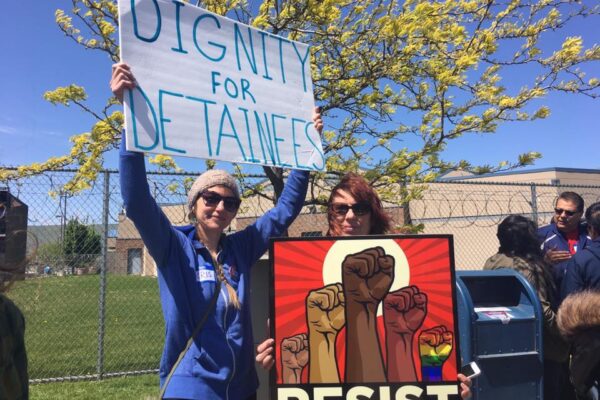Over the weekend, an interpreter and I met with Immigration and Customs Enforcement (ICE) detainees who were on a hunger strike that began Tuesday evening at the Northern Oregon Regional Correctional Facility in The Dalles (NORCOR). In the second hunger strike at NORCOR this year, detainees refused food to bring attention to poor conditions at the jail including inadequate food and poor nutrition, the high cost of commissary items, unaffordable phone and video calling rates, lack of in-person visits with family and friends, lack of access to any outdoor space and exercise, and inadequate library and activities.
Yesterday, detainees reported feeling weak after four days without meals, but were committed to seeing their demands addressed. ICE officials met with the hunger strikers Saturday afternoon after the group requested medical attention for a detainee who was doing poorly. The detainees agreed to end the strike when ICE officials committed to allow detainees three hours of free video calling every month, milk five days per week instead of one, hot breakfast on the weekends, the ability to wear warm underclothes and shoes as the jail only issues scrubs and sandals, improved library options that include books in Spanish, and access to actual outdoor yard space instead of the current small concrete recreation room with a partially open roof.
The detainees expressed deep and sincere gratitude for the public support of their efforts and felt it was a vital part of their ability to make change both for themselves and anyone that would have to suffer these inhumane and unconstitutional conditions at NORCOR in the future. One detainee shared this message:
“We appreciate the support… If we don’t see change, we will have to strike again. This isn’t just about us, but about the people that will come later.”
Oregon law prohibits the use of state and local resources to enforce federal immigration laws, and NORCOR has no business holding ICE detainees in the first place. The facility is already facing one lawsuit over their ICE contract, and the ACLU of Oregon has threatened litigation if conditions at NORCOR do not improve. Additionally, local organizers and clergy have pressured the jail to end its ICE contract. Last year, the jail took in $500,000 from its ICE contract and this year the number is expected to climb to over $1 million.
Jail administrators have repeatedly said that they only incarcerate detainees with criminal charges, but our investigation showed that was not true. The jail has held people who were denied entry at Portland International Airport including an Iranian woman visiting family and a Spanish college student who planned to spend the summer with a family in Corvallis. The jailing of these tourists was greeted with significant media attention and public outrage. , It was only after this intense scrutiny that NORCOR promised to discontinue this practice. And a terrifying question still remains: where is the federal government holding people now that NORCOR won’t take them?
Additionally, nearly all of the detainees held at NORCOR have no criminal matter pending. NORCOR is holding people in jail for ICE even though they have already completed their sentence, or the crime they committed required no jail time. For example, one of the detainees was being held at NORCOR had long finished her obligations to the state for her minor possession charge.
We are actively negotiating with the jail to improve conditions for all in its custody and to end its practice of holding ICE detainees. Oregon facilities should not be used to fuel the growth of President Trump’s cruel and inhumane mass deportation machine. It is prohibited by state law and runs contrary to Oregon’s desire to be a welcome and inclusive state.



